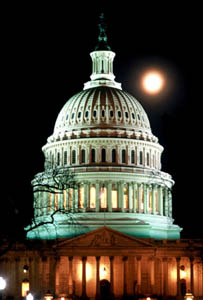
Looking at the state of the horse race less than a week before Election Day, the Bush Administration and its political allies in Congress have been unable to change the basic dynamic that will determine which party will control the House of Representatives.
During most election seasons right now, the playing field of competitive races is shrinking, with both parties allocating more resources to fewer races.
Of course, this isn't your typical election season. Political observers are talking about a Democratic wave hitting the country, but of course the full impact of that wave won't be known until after the ballots are counted.
Democrats seem to have adopted the Republican strategy of trying to lock its hold on ideologically friendly geographic areas (Republicans in the South, Democrats in the Northeast and parts of the Midwest). Some of the Democrats' biggest targets this year are Republican incumbents in Connecticut (Chris Shays, et. al.), New York (Tom Reynolds, et. al.), New Hampshire (Charlie Bass), and Pennsylvania (Curt Weldon, et. al.), although there are also state and local issues that will play a role in whether they are re-elected or not.
If there is a wave, look for several, if not a majority of these blue state Republicans to fall victim to it. In the Midwest, expect Ohio to be ground zero for any Democratic wave, given the political woes of the state and national GOP. Democrats could pick up Republican seats in blue states like Illinois and Minnesota. The Rothenberg Political Report lists 40 House races as toss-ups, all but three of them held by Republicans.
Pickup opportunities seem to be expanding the map for the Democrats all across the country. Look at two examples:
To most political observers, the race to succeed retiring Rep. Tom Osborne shouldn't even be a contest. Republicans have held Nebraska's 3rd district for the last 48 years. Democrats are throwing money and resources into Scott Kleeb's campaign. Republicans sent President Bush himself to hit the campaign trail for Republican nominee Adrian Smith. Nebraska voted for President Bush 66-33 in 2004.
A little farther out west, local and national Democrats are salivating at the possibility of picking up Dick Cheney's old seat in Wyoming, a state which overwhelmingly voted for President Bush in 2004, 69-29. How concerned is the GOP? Concerned enough that the NRCC dropped over $241,000 on TV ads attacking Democratic candidate Gary Trauner, and they sent Cheney himself out to Wyoming about a month ago and again a few days before the election to rally the troops for incumbent Rep. Barbara Cubin, who took a hit in the polls after threatening to slap a wheelchair-bound Libertarian candidate for pointing out her campaign contributions from former House Majority Leader Tom DeLay. CQ Politics is now ranking this race as a toss-up.
If Republicans lose these two seats, in solidly red states, then Election Day will be an unmitigated disaster for them. To put it into perspective by reversing the situation, that would be like a Republican candidate having a shot at winning a congressional race in a solidly blue district like Berkeley, Washington DC, or Boston. The fact that they're even spending money and resources defending them should tell you a lot about the national dynamics for the GOP.
Look at President Bush's campaign itinerary during the last week or so of the campaign. He is hitting states that voted for him during the last presidential election and with the exceptions of Colorado and Missouri, he is staying away from swing states where his presence could hurt Republicans on the ballot. On Saturday, he is stumping in Colorado for Rep. Marilyn Musgrave, one of the states where Democrats made gains in 2004 at the state level and are hoping to continue the trend this year.
This stop is interesting because Musgrave is one of the leading Congressional proponents of a federal amendment to ban gay marriage, and because of the Ted Haggard gay prostitute and meth bombshell which dropped in Colorado earlier this week. I should also point out that there is an amendment to ban gay marriage on the ballot in Colorado this year as well. Social conservatives might be more energized to get out the vote and try to get the bill passed in the aftermath of the recent New Jersey Supreme Court ruling. On the other hand, the initiative could fail in the aftermath of the Haggard allegations.
Whether the 2006 midterm elections will be like 1994, 1974, 1982, or 1964, or an entirely different animal altogether, is something we'll find out in a few short days.
House Prediction: Democrats take over the House of Representatives, winning between 15-25 seats on Election Day.
No comments:
Post a Comment